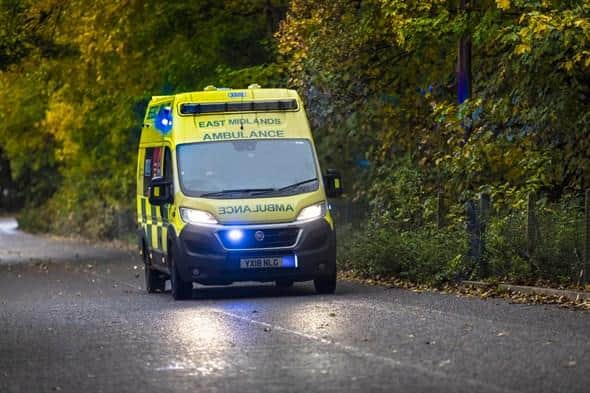Derbyshire residents warned of “much slower” response times as ambulance service workers set to strike this week
and live on Freeview channel 276
Industrial action will take place at the East Midlands Ambulance Service over the next two weeks – after a ballot by the GMB trade union – as part of a national pay dispute with the Government.
Some EMAS staff members will strike for 24 hours from 6.00am on Wednesday, December 21. Another 24 hour strike is scheduled to begin at 6.00am on Wednesday, December 28.
Advertisement
Hide AdAdvertisement
Hide AdMany of EMAS’ 4,000 staff members – which include frontline ambulance crews, control room staff and non-emergency transport workers – are members of a trade union. The organisation has predicted that the GMB strike action may include up to 50% of their employees.


Ben Holdaway, director of operations at EMAS, said: “During the period of the dispute, we will do all we can to minimise the impact on patient safety and will continue to work very closely with trade union colleagues, regional service providers and NHS employers.
“Our operational teams have developed contingency plans to aim to maximise the number of ambulance staff and volunteers we have available to respond to patients, as well as clinical staff able to carry out remote clinical assessments.
“However, we anticipate that on days where there is industrial action that there will still be fewer ambulances available and therefore our responses to our patients will, inevitably, be much slower on the day.
Advertisement
Hide AdAdvertisement
Hide Ad“Therefore our 999 control rooms, where possible, will carefully assess and prioritise an ambulance response for those who need it most, and this may only be where there is a threat to life.
“Patients should continue to call for an ambulance as normal if they experience a life-threatening emergency and should continue to access other more appropriate services for any other illnesses or injuries such as NHS111 online or contacting their local urgent treatment centre.
“We fully respect the right of NHS staff to take lawful and peaceful industrial action, however we do urge national employer representatives and trade union colleagues to proactively engage and reach a negotiated settlement to the dispute as quickly as possible.”
A number of derogations (also known as exemptions) have been agreed between the union and EMAS chiefs.
Advertisement
Hide AdAdvertisement
Hide AdFor the A&E ambulance service, these exemptions include either only responding to Category 1 calls (immediately life-threatening) or attending Category 1 calls and the most serious Category 2 calls – including chest pain, FAST-positive strokes, gynaecology emergencies where mother or baby are at risk, road traffic collisions where a patient is trapped, and unwell children aged five and under.
On the day of the strikes, many GMB members will either work as normal or take part in the industrial action – by exercising their right to strike or by deciding to work under exemptions agreed with their trade union.
EMAS have confirmed that there are no plans for support from the Armed Forces at this stage. They added that NHS pay levels are agreed at a national level, and are therefore negotiated nationally for NHS employees – rather than being controlled by EMAS itself.